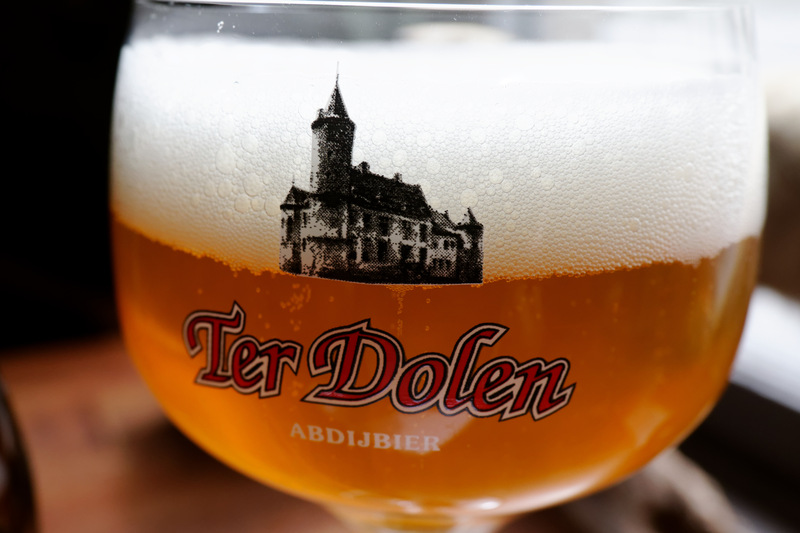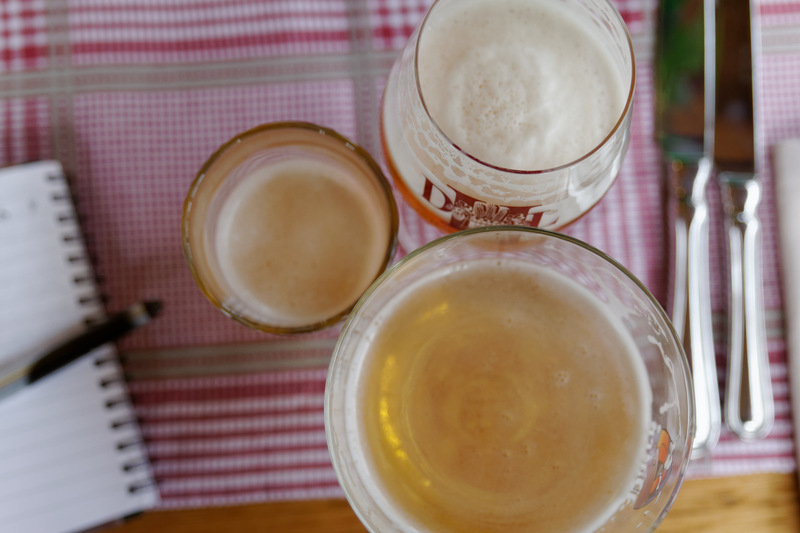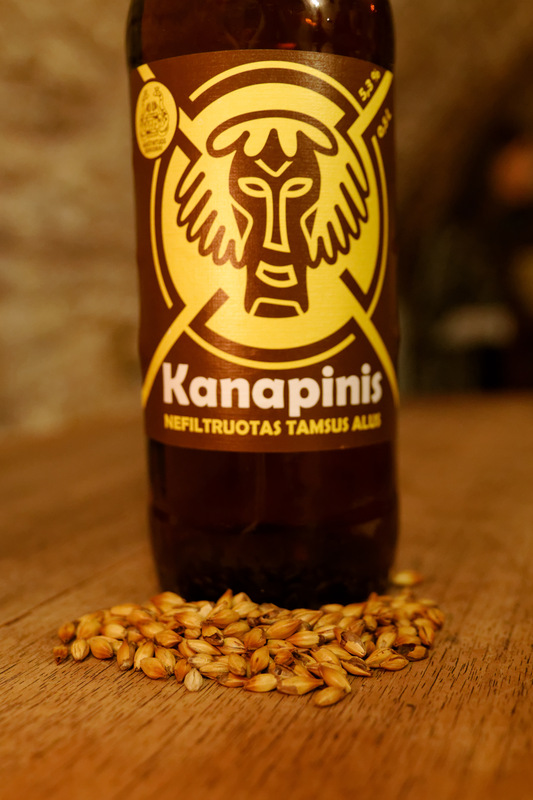Truly local beer requires a beer culture

Local beer from a real beer culture |
I expressed concern that beers are becoming more similar all over the world, even though there people who are trying to develop genuinely local beers, by exploring local ingredients and practices. As Martyn Cornell argues, it's hard to develop this into something genuinely local in a world where any ingredient can be exported anywhere. And, I might add, where everyone is eagerly copying everyone else.
I have to say I'm also generally skeptical about the idea that any one ingredient is going to somehow make the beer "local". Say you use cloudberries, or sea-buckthorn, or Myrica gale, or elderberries, or whatever. That's unusual, and some of these beers can be really, really good. But either way it's just a single ingredient, usually in a single beer. And what's so local about it, anyway? These ingredients grow in many places, and are (as mentioned above) easily exported.
What we're looking for here, I'd argue, is not so much ingredients or recipes as what I like to call a beer culture. It was Martin Thibault who first referred to Lithuania as a unique "beer culture," and I've adopted the term because I feel it gets to the heart of what makes Lithuania different. Because it's not the local yeast. It's not the local malts. And it's not having unique styles like keptinis. It's the sum of all that and more, which is what I mean by a beer culture. (For a longer explanation of this, please the book.)
Consider the concept of the Italian kitchen for a moment. It's more than pasta, or pizza. It's an entire frame of reference, setting expectations for how food should taste, what it should look like, how and where it should be made and eaten, and so on and so forth. Even the expected sequence of dishes (antipasto, primo, secondo, ..., dolce) is unique. Ingredients, dishes, cooking and flavour forms a whole, adapted to the circumstances and preferences of the locals.
A beer culture is similar. The English beer tradition largely took place in the pub, an institution with no exact equivalent elsewhere, and a whole host of rituals and social expectations. The beers were mostly low in alcohol, malt-based but light in body, low in carbonation, served from cask, top-fermented, clear, etc etc. There's the system of buying beer in rounds, the unique English beer styles, etc etc. As Martyn points out, there is also a clear connection with the local kitchen, in that the beers generally go well with the local food.

Local beer matching local food |
If we switch our focus to, say, Germany, the whole thing repeats. There's the kneipe with the stamm-tisch, the bier garten, a different set of styles, more carbonation, colder and fizzier beer, bottom fermentation, and so on. The expected flavours are different, as is the cuisine they match. We can repeat this in Belgium, or the Czech Republic, or Lithuania, and find similar ensembles of cultural expectations, all forming a coherent whole.
A country like Norway, on the other hand, doesn't really have this. There are some local versions of international styles, but the culture as a whole is so small that if you wanted you could argue that it doesn't really exist. (Well, to be precise, the commercial culture barely exists. There is a submerged farmhouse culture.) A commercial culture could, however, be developed. Maybe.
When the Black IPA style was introduced not long ago, many of the US versions were essentially porters with IPA hop bills. Sharp, bitter resiny citric tropical fruit flavours crashing head on with sharply roasted chocolate flavours. I didn't really like these beers much, as I felt the combination was too disharmonic to work well. Danish brewers, however, have come up with a different take, using soft earthy dusty malty lightly roasted malts together with kiwi and gooseberry flavours from New Zealand hops. So many Danish brewers have done this that you could almost identify a Danish substyle of Black IPA.
A similar development, repeated across all the various styles and turned into one harmonic whole, would be the beginnings of a beer culture. Add to it the Danish kro, a connection with Danish food, the Danish attitude to beer, and we would be getting somewhere. Especially if the Danes started growing (and using!) their own barley, hops, and yeast. It could happen. It may even be that it will happen by itself, as local breweries grow, imitate each other, and the demand for local ingredients grows.
Unfortunately, strong forces are pulling the other way, toward drowning everything in the soup of sameness. Craft brewers collaborate as much, or maybe even more, across national borders as within them. And they copy each other, and eagerly adopt ingredients, styles, and tricks from anywhere if they feel it sets them apart in their local market. So we're perhaps equally likely to see a future in which every country has some US-style brewers, some Belgian-style, some English style, and so on.

Uniquely local beer |
What can be done about this? I don't know if anything can, or should, be done. Banning international collaborations hardly seems productive. As some readers of the previous blog post noted, this is the same process that's generally described as globalization, and there's nothing about it that's specific to beer. It's possible that in a globalized world, beer must necessarily be global, too. Or maybe rising oil prices and CO2 taxes will change everything by reversing the process that containerization began. I don't know.
But I'm glad that more people are taking the issue seriously.
Similar posts
The sameness of craft beer
I can remember when and where I became seriously interested in beer
Read | 2014-11-25 18:11
Trying to understand Lithuanian beer
Now that I've visited Lithuania three times, and finally gotten to actually meet some of the brewers, I feel I am at last beginning to understand a least a little of Lithuanian beer
Read | 2013-09-02 20:00
Up and coming beer destinations?
The subject for this month's The Session was: "What are the up-and-coming beer locations that you see as the next major players in the beer scene?" Well
Read | 2015-03-06 18:04
Comments
Stan Hieronymus - 2014-12-02 21:30:21
Here's the thing. You visit Franconia and they will tell you their beer culture is much different (and therefore better) than in Bavaria. And you've seen the map - they are surrounded of Bavaria.
Almost every beer region can be full of subcultures or microcultures.
Do they continue to multiply or will they be swallowed by copycat sameness? Where I live microcultures are holding their own.
Lars Marius - 2014-12-03 09:03:39
Stan, that's true, but these are cultures that grew up a very long time ago. Since then they've been slowly dying and merging with their neighbours. To the extent that there are any other trends it's a trend to pick up US craft influences. So I'm not convinced that these two cultures have really been holding their own.
To me, the real question is whether anyone could build a new culture today. The last ones I know of are the US west coast and Lithuania. But maybe I'm missing something.
Stan Hieronymus - 2014-12-04 12:58:42
I'm repeating myself, but I think the new cultures may be micro size, and they will be truly new, not replicating something from the past.
heikki S. - 2014-12-06 11:40:41
Well, I would love to make local beer if it is possible to find local malt, hops and cultures. IMHO it is not necessary to create authentic historical beers to create a local beer culture. I would rather go for modern styles, just made with local (kortreist?) ingredients. If local ingredients were available, then use these to encourage experimentation among homebrewers and microbreweries. Heck, this just gave me a business idea. (I'm an biotech entrepreneur, though a bit occupied a.t.m. to do this for myself.)
Ed Pemberton - 2014-12-07 12:46:23
There is some irony in a Norwegian bemoaning the lack of Norwegian beer identity but doing so in English prose. I have no fault with your premise and no intended malice, but I do find the concern about globalization an interesting backdrop to this considering that by writing in English you've made this into something that people all over the world can read.
Relik - 2014-12-12 03:16:07
Its a little unfair to compare the North American beer culture to that of any country in Europe just do to the fact that compared to the age of established countries here (mere infants) and the size land mass ( yes the old USSR was larger but at one point it wasn't united). Yes, micro cultures pop up here and there ie. west coast high hopped bitter bigger badder brews develop here in North America we are blessed with the opportunity get the immigrants from great countries with wonderful beer culture who wish to bring a little piece of home (in beer form and or food form) to their new home. Beer in the "New World" is for the most part still new and craft beer while seeing success; it will take time to see any see anything larger than those micro-cultures form and still there will be blending of styles to fit our needs.
Are we experiencing a "same-ness" in beer, no i don't think so because we are all still learning, experimenting, and improving the art and the science of brewing. Tradition still has a huge place in global beer culture just as much as the newer world styles have.